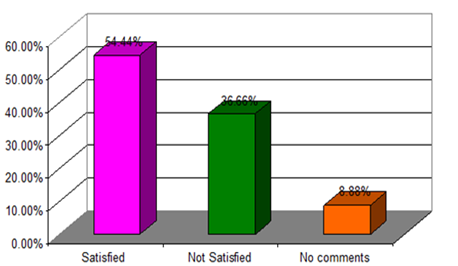Health care seeking behaviour among the rural adult women of Srinagar Upazilla of Munshigonj, Bangladesh
Abstract
There has been an increasing availability and accessibility of modern health services in rural Bangladesh over the past decades. However, previous studies on the health care seeking behaviour of the rural people of Bangladesh were based on limited number of factors (Variables) focusing mainly on the rural adult people both male and female. This cross sectional descriptive study was conducted to determine the health care seeking behavior among the rural adult women. Two hundred and seventy adult women from several villages of Srinagar Upazila under the district of Munshigonj were interviewed for the study. Data were collected by face to face interview form the respondents through a semi-structured questionnaire by purposive sampling method. From this study it was found that the mean age of the respondents was 26.94 years with standard deviation +11.53 years. Majority of them were married (55.55%). Most of them were Muslims (93.33%). Among 270 respondents 30.00% were of H.S.C level and 15.55% were illiterate. Among the husbands of the married women proportion of illiteracy was 35.85%. About 22.22% respondents had family income below 5000 tk. per month and 67.78% of the respondents had nuclear family. The most common disease they suffered from was fever (16.22%). The other mentionable diseases were Joint pain 9.46%, Cough and Cold 8.11%, Peptic ulcer 6.76% and Hypertension 4.05%. Most of the respondents (26.66%) went to Thana Health Complex for seeking for health care. Another 16.67% women went to Private MBBS Doctor. Only 1.11% went to Community Clinic. Forty percent (40%) of the diseased women went to Local health center because of reliability and 21.11% went there as treatment cost is low. Almost all (98.89%) of the respondents replied that they should go to a qualified (MBBS) doctor. 54.44% rural adult women of Srinagar were satisfied about the treatment facilities in Local Govt. Hospital/THC. Majority (43.33%) of the women were referred to specialized hospital in Dhaka after treatment failure in Primary site. During illness majority of the respondents (34.44%) took decision themselves for seeking health care. 20% women took decision combined with their husband. During the illness of their children 28.23% women went to Local Govt. Hospital/THC and 22.35% went to MBBS Doctor Privately. Majority of the respondents (30%) thought that they could get modern treatment from THC/Govt. Hospital and 25.55% thought that it could be found from Private MBBS Doctor. Among the 270 respondents 54.44% were willing to participate in local health awareness program. In my study I have found association between the economic status of the respondents and their satisfaction about the treatment facilities in Local Govt. Hospital. There was a significant relationship between the educational level of the respondents and their willingness to participate in local health awareness program. The respondents who were of HSC level of education were mostly (81.48%) willing to participate in such health program. In my study the findings could not be compared to similar type of findings of other studies, because there were limited references. The association between economic status of the respondents and satisfaction about the treatment facilities can be evaluated from further in-depth study.
Downloads
References
UN Population Fund (UNFPA), Bangladesh’s total population rose to 16.44 crore: UNFPA report 2010.
Bangladesh Bureau of Statistics, Preliminary report HIES. 2010.
Rabbani G. Agenda Setting on Community Health in Bangladesh. Thesis Submitted, North South University, June 2010.
Katung PY. Socio-economic factors responsible for poor utilization of PHC services in rural community in Nigeria. Niger J Med, 2001;10:28-29
Nutritional Surveillance Project UNFPA; Female decision making power and nutritional status within Bangladesh’s socio economic contex. Bulletin No. 20, August 2006.
Hanson K. Berman P. Private health care provision in developing countries: a preliminary analysis of levels and composition. Health Policy Plan, 1998; 13:195-211.
Sadiq H. Muynck AD. Health care seeking behaviour of pulmonary tuberculosis patients visiting Rawalpindi. J Pak Med Assoc, 2002; 51:K)-16.
Asian Development Bank. Bangladesh: Rural Infra Structure Improvement Project. September 2010.
National Institute of Population Research and Training, Mitra and Associates and Macro International. “Bangladesh Demographic and Health Survey 2007”. March 2009.
Bennett Milton Rich. Martha Braun. The Aging a Guide to Public Policy-1984, 64-275.
P, Nahar Kabir, Z, Nilsson J and Zaman, Dynamics of Health Care Seeking Behaviour of Elderly People in Rural Bangladesh, 1(1) PP 69-89, ISSN 1952-8670
Ahmed SM, Adams AM, Chowdhury M, Bhuiya A, Gender, Socio-economic development and health seeking behaviour in Bangladesh, BRAC Research and Evaluation Division, BRAC Center, 2000 Aug. 51 (3) 361-71.



























